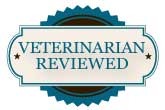
Equine colic is not one specific disease, but a symptomatic term. Loosely defined, colic means abdominal pain. As with abdominal pain in humans, colic in horses can stem from a vast number of causes.
Causes of horse colic
Overfeeding, rapid intake of feed, impaction in the digestive tract, parasites, an abrupt change in diet, too much grain, tainted hay, lack of water during lengthy travel, ingestion of sand, and other factors, including stress and long term use of NSAIDS, are among the myriad causes of colic. Causes usually relate to the horse's anatomy and the microflora in the horse's gastrointestintal tract.
Horse colic is an emergency
Any kind of colic is an emergency that requires a veterinarian's attention. Signs of colic include: loss of interest in food and water, strange postures, pawing, rolling, biting at flank, bloating, sweating, and an absence of gut sounds.
- Given the small capacity of the horse's stomach, it is susceptible to distention when the horse ingests too much feed at any one time. Too much distention of the stomach can result in a fatal rupture.
- Inflammation of the intestine due to bacteria, tainted feed, or other causes may result in great discomfort, diarrhea, and other threats to the horse's well-being, including colic.
- With the large intestine folding and changing directions and diameters, a mass of coarse feed, sand, or foreign material may block the intestine, causing gut activity to become erratic or cease altogether.
- A heavy buildup of dead parasites can create colic as they clump together in a mass after being eradicated by a deworming procedure.
- Dehydration can cause impaction because of lack of fluids in the horse's digestive system, resulting in colic.
- Because the small intestine is freely suspended in the abdominal cavity, it can become twisted easily, causing pain, restricting blood flow, and creating gas buildup. This kind of colic demands immediate surgical intervention.
- Sometimes, colic is caused by painful contractions of the smooth muscles in the intestines. This is similar to indigestion in people and is usually easily treated.
- All colics involve gas buildup. As the gas builds up, the gut distends, and the small and large intestines may also swell, causing severe pain. This can often be treated by a veterinarian who inserts a stomach tube to relieve pressure and accumulation of fluids.
Calling your veterinarian at the earliest sign of colic is extremely important since many cases of colic can be treated with medication. More serious cases may require immediate surgery to save the life of the horse. It is important to know that horses have variable pain tolerances. Even if a horse seems only "a little off," it is best to call the veterinarian rather than take a "wait-and-see" approach. An outwardly calm horse may have a serious problem, while one in apparent agony could have something more mild.
After calling the vet, what to do
Once you have called your veterinarian, remove all feed, but make water available in case the horse wants to drink. Let the horse rest if possible and make sure the horse is in a safe area, such as a stall with padding on the floor.
If the horse is not violently painful, handwalking can be helpful for mild cases of gas colic. However, do not attempt to walk a horse that is attempting to fling itself to the ground. You cannot prevent a horse from rolling if it is determined. Always consider human safety first.
Do not administer any medication. Usually the veterinarian will be able to treat the horse on-site. If displacement or impaction is suspected, the horse may be referred to an equine surgical hospital.
In any case, being well-informed about the causes and treatments for colic will help the horse owner be prepared to make sound decisions.
Dig deeperTM
Our reference library has more articles on colic. You may want to read Colic - Flatulant for more about gas colic, and Colic - Obstruction and Colic - Spasmodic for these other common types of colic.
